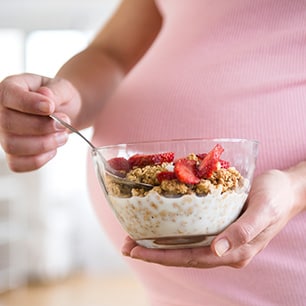Published April 1, 2023
The first step to covering a growing baby’s nutrient needs can start with what mothers eat months before a pregnancy.

Planning for a pregnancy?
Deciding to grow your family can be an exciting time. Planning begins for nurseries, baby names, outfits, books, and new toys that you are convinced will make your baby the smartest on the block. But did you realize that the baby’s mental development begins long before you play that first educational video? In fact, your baby’s health journey begins before you even become pregnant—it starts with your health!
Watch your weight.
Did you know that your health can impact the likelihood you will have a healthy, full-term pregnancy? For both potential parents, Body Mass Index (BMI) plays a role in preconception health. For Dad, BMI affects fertility levels and sperm health.1 For Mom, BMI has even more potential impacts. To achieve the healthiest pregnancy possible, try to reach a healthy weight before conception. Being overweight affects how your body and joints feel during pregnancy and increases the likelihood of high blood pressure, preeclampsia, gestational diabetes, miscarriage, and stillbirth. Your baby is also more likely to experience premature birth and/or birth defects if you are overweight or obese.2
Balance your diet.
You can also help your baby—and yourself—by eating a well-balanced diet. Once you decide to get pregnant, medical professionals recommend that you begin taking a prenatal vitamin.3 You can get prenatal vitamins at your local Publix. This should be taken with, rather than in lieu of, a balanced plate. There are certain nutrients that you should focus on both before and during pregnancy, including folic acid, iron, iodine, calcium, omega-3s, choline, and vitamins A, C, D, and B12.
Let’s take a look at how these nutrients may benefit you and some food sources where they can be found. As usual, please check with your physician or healthcare provider before making any drastic changes to your diet or supplement regimen.
Get the nutrients for a worry-free pregnancy.
Folic acid helps prevent birth defects, specifically those related to the brain and spine. It also supports general fetal growth and development. Some of the best places to get folic acid are fortified cereals, spinach, black-eyed peas, asparagus, brussels sprouts, and romaine lettuce.
Iron helps your red blood cells deliver oxygen to the fetus. Sources include fortified breakfast cereals, white beans, cooked oysters, lentils, spinach, and tofu.
Iodine is essential for healthy brain development. It’s found in iodized table salt, dairy products, cod, cooked oysters, and eggs.
Calcium helps build strong teeth and bones. It’s found in milk, yogurt, fortified orange juice, sardines, tofu, salmon, and soybeans.
Omega-3 fatty acids are building blocks of the fetal brain and retinas. They can be found in low-mercury seafood, flaxseeds, chia seeds, and walnuts. Read more about sources and benefits of omega-3s.
Choline is also important for the baby’s brain and spinal cord development. Sources of choline include eggs, beef, cod, chicken breasts, red potatoes, kidney beans, and soy products.
Vitamin A helps with healthy eyesight and skin. It can be found in sweet potatoes, spinach, carrots, herring, fortified milk and breakfast cereals, cantaloupe, red peppers, and mangos.
Vitamin C promotes healthy bones, gums, and teeth. Good sources include citrus fruits and juices, green and red peppers, broccoli, brussels sprouts, tomatoes, cabbage, cauliflower, spinach, strawberries, and cantaloupe.
Vitamin D helps build your baby’s bones and teeth. It also promotes healthy skin and eyesight. You can get vitamin D from sunlight, fortified milk and cereals, salmon, and white mushrooms.
Vitamin B12 helps form red blood cells and maintain the nervous system. It can be found in beef, turkey breast, clams, salmon, canned light tuna, dairy, eggs, and fortified breakfast cereals..
While the list may seem overwhelming at first blush, it will seem simpler when you notice that there are themes to the sources listed above. Let’s turn some of these around and make them appear less daunting:
Dark, leafy vegetables like spinach contain vitamins such as folic acid, iron, and vitamins A and C. Seafoods (salmon or cooked oysters for example) contain iodine, calcium, omega-3 fatty acids, and vitamins D and B12. Legumes (such as lentils, black-eyed peas, and kidney beans) are good sources of folic acid, iron, and choline.
See how many of those nutrients you can incorporate into your diet by focusing on the sources rather than becoming overwhelmed by a list of nutrients. Supplement a dinner of salmon, leafy green vegetables, and beans with a breakfast of eggs for choline and oranges and strawberries for vitamin C. Throw in a piece of whole grain toast for fiber and a glass of low-fat milk for calcium to balance that breakfast plate, and you’ll be good to go. With those two meals alone, you’ll have touched on all the nutrients listed above in one day before adding in whatever better-for-you choice you make for lunch!
You can also check out some of our nourishing and delicious Better Choice recipes that check the nutrient boxes. Try our Publix Aprons® Broccoli Pesto Pasta with Walnuts and Chicken for a colorful plate of delicious nutrients (such as omega-6, protein, and vitamin C), or Saag Tofu for a flavorful vegetarian option.
You can also get seafood servings with recipes such as Couscous-Crusted Mediterranean-Style Salmon with Italian-Blend Salad or Ancho Salmon with Corn Relish and Avocado Rice.
While there are many foods you should focus on eating before and during pregnancy, there are also some foods that you should be careful to avoid while pregnant for the safety of your baby.4
- Raw or undercooked meat, seafood, or eggs
- Deli meats or hot dogs that have not been reheated until steaming
- Fish that is high in mercury
- Smoked seafood
- Soft cheeses, unless they clearly state they are made from pasteurized milk
- Unpasteurized milk
- Fresh-squeezed juices
- Alcohol
You should also avoid taking too much vitamin A, especially if supplementing. This can lead to serious birth defects in the baby.5 When considering these guidelines, along with those of your physician, rest assured you are doing all you can to ensure a healthy pregnancy for both Mom and baby.
Even if you are not pregnant or planning to become pregnant, there are ways you can help promote healthy moms and babies. One way is by supporting March of Dimes, whose mission is to lead the fight for the health of all moms and babies. During the month of April, donate at the register of your neighborhood Publix to support this nonprofit. You can also support their cause by donating online or joining a local fundraising event.
For the love of you.
Choosing how you eat is uniquely personal. It’s about your needs, your preferences, and your goals. As your wellness ally, we’re in your corner with fresh ideas, recipes, and wellness icons that make it easier to shift toward wiser food choices. It’s all about you, at your very best.
Sources
1 Palmer, Nicole O., Hassan W. Bakos, Tod Fullston, and Michelle Lane. Impact of Obesity on Male Fertility, Sperm Function and Molecular Composition. National Library of Medicine. October 1, 2012.
2 Healthy Weight Before Pregnancy. March of Dimes. July 21, 2021.
3 Vitamins and Other Nutrients During Pregnancy. March of Dimes. Last modified September 2020.
4 Vitamins and Other Nutrients During Pregnancy. March of Dimes. Last modified September 2020.
5 Maia, Sabina Bastos, Alex Sandro Rolland Souza, Maria de Fátima Costa Caminha, Suzana Lins da Silva, and Rachel de Sá Barreto Luna Callou Cruz. Vitamin A and Pregnancy: A Narrative Review. National Library of Medicine. March 2019.

 You are about to leave publix.com and enter the Instacart site that they operate and control. Publix’s delivery and curbside pickup item prices are higher than item prices in physical store locations. Prices are based on data collected in store and are subject to delays and errors. Fees, tips & taxes may apply. Subject to terms & availability. Publix Liquors orders cannot be combined with grocery delivery. Drink Responsibly. Be 21. For prescription delivery, log in to your pharmacy account by using the Publix Pharmacy app or visiting
You are about to leave publix.com and enter the Instacart site that they operate and control. Publix’s delivery and curbside pickup item prices are higher than item prices in physical store locations. Prices are based on data collected in store and are subject to delays and errors. Fees, tips & taxes may apply. Subject to terms & availability. Publix Liquors orders cannot be combined with grocery delivery. Drink Responsibly. Be 21. For prescription delivery, log in to your pharmacy account by using the Publix Pharmacy app or visiting 
